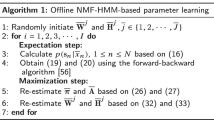Abstract
A hybrid method for speech enhancement based on Non-Negative Matrix Factorization (NMF) and statistical modeling is presented for using speech and noise bases with online updating is proposed. In the presence of nonstationary noises, template-based approaches have shown better performance when compared to statistical modeling but these approaches depend on a priori information. To overcome the drawbacks of these approaches, a hybrid method is developed. The performance of the proposed method is further improved by considering speech bases as well as noise bases. In terms of Source-to-Distortion ratio (SDR) and Perceptual Evaluation of Speech Quality (PESQ) the proposed method have outperformed the traditional algorithms in nonstationary noise environment conditions.
Access this chapter
Tax calculation will be finalised at checkout
Purchases are for personal use only
Similar content being viewed by others
References
Miyazaki R, Inoue T, Takahashi K, Kondo K, Saruwatari, H, Shikano Y (2012) Musical-noise-free speech enhancement based on optimized iterative spectral subtraction. IEEE Trans Audio Speech Lang Process 20(7):2080–2094
Ephraim Y, Malah D (1985) Speech enhancement using a minimum mean-square error log-spectral amplitude estimator. IEEE Trans Acoust Speech Signal Process ASSP-33:443–445
Loizou PC, Rangachari S (2006) A noise-estimation algorithm for highly non-stationary environments. Speech Commun 48:220–231
Wilson KW, Smaragdis P, Raj B (2008) Regularized non-negative matrix factorization with temporal dependencies for speech denoising. Interspeech, pp 411–414
Smaragdis P, Mohammadiha N, Leijon A (2013) Supervised and unsupervised speech enhancement using nonnegative matrix factorization. IEEE Trans Audio Speech Lang Process 21(10):2140–2151
Mohammadiha N, Leijon A, Gerkmann T (2011) A new linear MMSE filter for single channel speech enhancement based on nonnegative matrix factorization. In: 2011 IEEE workshop on applications of signal processing to audio and acoustics (WASPAA), pp 45–48
Lee SJ, Park JH, Kim HK, Kim SM, Lee YK (2012) Non-negative matrix factorization based noise reduction for noise robust automatic speech recognition. Lect Notes Comput Sci 7191:338–346
Rinaldo R, Canazza S, Montessoro PL, Cabras G (2010) Restoration of audio documents with low SNR: a NMF parameter estimation and perceptually motivated bayesian suppression rule. In: Proceedings of sound and music computing conference, pp 314–321
Hyekyoung Lee N, Eungjin Choi AC, Kim Y-D (2008) Nonnegative matrix factorization with α–divergence. Pattern Recognit Lett 29(9):1433–1440
Kwon K, Kim NS, Shin JW (2014) Speech enhancement combining statistical models and NMF with update of speech and noise bases. In: IEEE international conference on acoustics, speech and signal processing, 4–9 May. Florence, Italy, pp 7053–7057
Garofolo JS (1988) Getting started with the DARPA TIMIT CD-ROM: an acoustic phonetic continuous speech database. National Institute of Standards and Technology (NIST), Gaithersburg, MD, USA
Steeneken H, Varga A (1993) Assessment for automatic speech recognition: II. NOISEX-92: a database and an experiment to study the effect of additive noise on speech recognition systems. Speech Commun 12:247–251
Durrieu J-L, Fevotte C, Bertin N (2009) Nonnegative matrix factorization with the Itakura-Saito divergence: with application to music analysis. Neural Comput 21(3):793–830
Ephraim Y, Malah D (1984) Speech enhancement using a minimum mean square error short-time spectral amplitude estimator. IEEE Trans Acoust Speech Signal Process 32(6):1109–1121
Browne M, Berry MW, Langville AN, Plemmons RJ, Pauca VP (2007) Algorithms and applications for approximate nonnegative matrix factorization. Comput Stat Data Anal 52(1):155–173
Loizou P, Hu Y (2008) Evaluation of objective quality measures for speech enhancement. IEEE Trans. Speech Audio Process 16(1):229–238
Vincent E, Fevotte C, Gribonval R (2006) Performance measurement in blind audio source separation. IEEE Trans Audio Speech Lang Process 14(4):1462–1469
Author information
Authors and Affiliations
Corresponding author
Editor information
Editors and Affiliations
Rights and permissions
Copyright information
© 2019 Springer Nature Singapore Pte Ltd.
About this paper
Cite this paper
Sunnydayal, V., Sirisha Devi, J., Nandyala, S.P. (2019). Hybrid Method for Speech Enhancement Using α-Divergence. In: Saini, H., Sayal, R., Govardhan, A., Buyya, R. (eds) Innovations in Computer Science and Engineering. Lecture Notes in Networks and Systems, vol 74. Springer, Singapore. https://doi.org/10.1007/978-981-13-7082-3_48
Download citation
DOI: https://doi.org/10.1007/978-981-13-7082-3_48
Published:
Publisher Name: Springer, Singapore
Print ISBN: 978-981-13-7081-6
Online ISBN: 978-981-13-7082-3
eBook Packages: EngineeringEngineering (R0)




